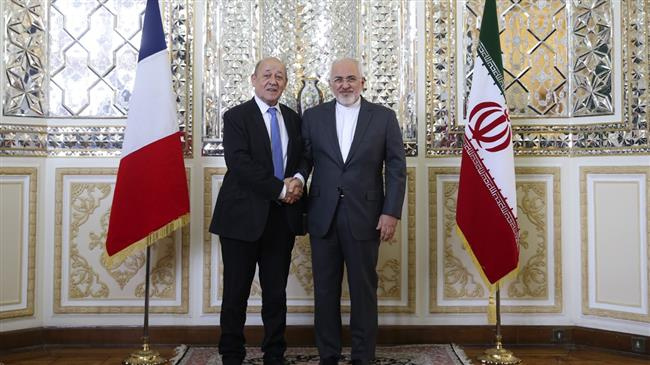Iran Pressed to Choose; Engage in Talks or Lose Nuke Deal

Hours before landing in Tehran, French Foreign Minister Jean-Yves Le Drian said Iran needed to address international concerns over its ballistic missile program or it risked new sanctions.
"There are programs for missiles that can travel several thousand kilometers, which are not compatible with UN Security Council resolutions and which exceed the needs of defending Iran's borders," Jean-Yves Le Drian told the Journal du Dimanche newspaper.
"If not tackled head on, this country risks new sanctions," he added, according to quotes published by France 24.
Le Drian's two-day visit, which started on Monday evening, includes meetings with Iranian President Hassan Rouhani, Supreme the secretary to National Security Council Ali Shamkhani and Foreign Minister Javad Zarif to discuss bilateral, regional and international issues.
The visit is of particular importance not only for Iran and France but also for the European Union. In recent months, the EU, and in particular France, have made extensive efforts to safeguard the nuclear deal.
Paris has repeatedly resisted US pressure to rectify the JCPOA. US Secretary of State Rex Tillerson visited Europe in February to convince US allies but could not achieve what he wanted.
France, Germany, and even the UK stressed on keeping the deal. Nonetheless, US pressures has made EU to find another way to put Iran under pressure. European countries are critical of Iran's regional policies and missile program.
France has expressed concerns over Iran's missile program and President Emmanuel Macron has called for international surveillance on the program.
However, Iranian officials have always called the missile program to be based on the doctrine of defense and deterrence, negotiation over which is a red line for the country regardless of the situation.
During the past two weeks however, Iran has given the green for talks about regional issues. Iranian diplomats have engaged with British counterparts over the Yemeni crisis, even though the talks do not seem to be substantially serious.
Ball in Iran's court
Will Iran concede to Europe's conditions in order to keep the nuclear deal alive? What will the French Foreign Minister achieve in his Tehran visit? In an interview with moderate Iranian website Fararu publish on Monday, university professor and Europe analyst Ali Bigdeli said France has begun a multifaceted game. "They want to handle the game so that everything is completely in their control. They should work with the US on the one hand while they should have diplomatic cooperation with Saudi Arabia and Israel. A third side of the game for France is Iran," Farau quoted Bigdeli as saying.
Le Drian visits Iran for two major objectives, according to Bigdeli. "For one thing, he does not want to lose Iran's market. Considering the economic crisis in the EU and France, a country with 80 million people and abundant economic potentials is important for them," Bigdeli told Fararu.
"On the other hand, the French foreign minister wants to reconcile Iran and the US. He is somehow trying to press Iran to materialize EU's three conditions put forth by German Foreign Minister Sigmar Gabriel. These are to halt missile tests, to stop regional and political measures in the region, and to observe human rights. As Gabriel said, this package should go along the JCPOA. If Iran fails to follow, the deal will fail too," the international affairs expert said.
Bigdeli said the attitudes of the US and EU have become closer in recent weeks and the EU has distanced itself from Iran. "It is Iran's turn to put something on the table because Le Drian will definitely focus on the three axes his German counterpart announce," he added.
The university professor believes Iran may show flexibility in its missile program but "it is a tough thing for Iran to pull back in regional issues". Bigdeli said Iran has been working for a united region, and in doing so, it has given many lives and economic costs. "Nonetheless, these will be EU's propositions and if Iran does not welcome them, the EU may walk out of the deal," he added.
Speaking on how likely it is for Iran to accept talks about regional issues, the pundit said the EU is under pressure from three sides, namely the US, Saudi Arabia, and Israel. "The important question is what will Iran have to say if it engages in talks over regional issues. The country has been under extensive attacks. Saudi Arabia is spending generously against Iran and has elaborate moves on the agenda. In Mohammad bin Salman's London and Washington visits, Iran is a hotspot," Fararu quoted Bigdeli.
Asked if a potential missile agreement between Iran and Europe could improve the atmosphere for Iran, Bigdeli said the three issues raised by Gabriel has not separable. "Europe insists on a change in regional issues. Iran is in a tough situation and should make a wise decision, or it will become dangerous," he said.

